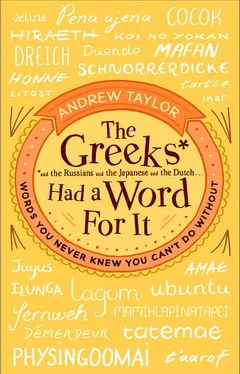It’s very likely that most Swedes wouldn’t understand. Like everyone else, they see the virtue of hard work and appreciate the benefits of ambition, but the Swedes also see that scrabbling as fast as you can for money and advancement has a downside. Not only are you likely to trample on other people as you elbow your way up, you also tend to miss out on a lot of things like time with your family, relationships, reading a book or just sitting smelling the flowers. The word that most Swedes would choose to sum up their attitude to life would be lagom ( la-GOHM ).
Lagom is used to express satisfaction, and if you ask a group of Swedes for a word that encapsulates the essence of living in Sweden, that’s the one they would probably choose. It means just right, not too much or too little – but without the rather grudging air of ‘satisfactory’ or ‘sufficient’ in English. How are you? Lagom . Is your coffee hot enough? Lagom . How’s the weather? Lagom . Someone’s height may be lagom , so may the number of people at a party.
It’s a positive word, and many Swedes would extend its use from the expression of satisfaction with the amount of food on their plate to describing the nature of Sweden’s politics. It’s a social democratic, middle-of-the-road country where taxes are high and people might find it hard to get rich, but where everyone is looked after and life is … well, lagom . It means equality and fairness: there is enough for everyone.
Work–life balance is important to the Swedes. Whereas in the City of London or on Wall Street, burned-out executives are reputed to leave jackets over their chairs when they stagger home after a sixteen-hour day so that people will think they’ve just slipped out for a moment and are still working at their desks, in Stockholm that would simply cause bemusement. If you have to work such long hours, it means that you’ve planned your work badly, they would think. Your career, too, should be lagom .
Clearly they’re doing something right, because Sweden always figures at or around the top of the league tables that are produced periodically, setting out the countries where people are happiest and most content. And in London, too, perhaps there seems to be a shift of emphasis away from chasing the last commission and towards aiming to be home in time to put the children to bed. Younger people are less ready to sell themselves body and soul to the company in the way that their parents’ generation did.
So maybe lagom is a word that the English language is waiting for. Would it be a good thing to have it in the dictionary? Well, not too good, not too bad. Just lagom .
Unspecified activities which give the appearance of being busy and important in the workplace
Technology, as we all know, makes simple things more complicated.
In big bureaucracies like the Civil Service, the EU or the BBC, all you once needed to get to the top were brackets after your job title and a clipboard – the brackets to prove you were important, and the clipboard to prove you were busy.
The brackets were the most important part of your official role. If you were a simple News Editor at the BBC, you were expected to perform some comparatively menial task such as editing news. If your title was Editor (News), then the brackets told the world that you were a person of substance, who would be involved in strategic blue-sky thinking, analysis and inter-departmental relations, rather than actually doing anything. You would no more dream of editing news than you would of washing up the coffee cups. You have to be important before you can be successful.
But even though you avoided doing anything, you had to look busy. You had to give the appearance of being proactive and decisive as you strode confidently down the corridor from the morning medium-term forward planning symposium to the Performance Analysis Unit. Nothing was better for that than being armed with a clipboard. You could stop and make notes on it occasionally, but the clipboard itself would do the trick.
But now clipboards belong in a museum. They’ve been replaced by tablet computers and smart phones – and since everyone has those, and no one can tell whether you are devising strategically vital spreadsheets on them or checking your Facebook page, they’re no use at all for making you look important.
What you need these days is epibreren .
But even though you avoided doing anything, you had to look busy.
Epibreren ( ep-i-BREER-un ) is a Dutch word originally coined by the newspaper columnist Simon Carmiggelt, and it means – well, it means nothing at all. That is the beauty of it. Carmiggelt claimed in one of his columns that the word had been revealed to him in 1953 by a civil servant from whom he had requested some papers. The papers, said the civil servant, still needed epibreren . Intrigued, Carmiggelt asked what epibreren meant, and the civil servant eventually confessed that it had no meaning. It was a word he had made up to fend off enquiries.
The story is almost certainly just that – a story. Carmiggelt was a talented columnist with a column to fill. But the word epibreren survived and has come to refer to unspecified activities that sound as though they might be important but don’t actually amount to anything. In short, it’s a catch-all excuse for inaction, laziness or inefficiency, which also manages to make the speaker sound rather grand. The theory is that people never like to admit that they don’t understand what someone has said, so if the excuse is given with sufficient confidence and in crisp efficient tones which suggest that the speaker has very important things that he or she has to be getting on with, it’s likely to be accepted. But it’s more than just an excuse – not only does it fob off enquiries, it also makes you look like a person of stature, someone at the top of the food chain. It’s the verbal equivalent of the once-ubiquitous clipboard.
We’re much less subtle in English. Our excuses, such as ‘The cheque is in the post’ or ‘My computer has gone down’, are so crude that they generally aren’t even meant to be believed. ‘The dog ate my homework.’ The problem with them is they indicate an acceptance that something is wrong, even though they pass the blame on to someone or something else. The beauty of epibreren is that it reflects the fault back on to the complainer – ‘Can’t you understand how important this is?’ it seems to say. ‘How could you be so inconsiderate as to waste my valuable time with these petty questions?’ It has just the sort of empty, airy superiority that a senior executive needs.
Perhaps we could adapt the word to describe all vacuous attempts to avoid responsibility? Who knows, in a few years’ time, most big bureaucracies could even have a Department of Epibreren . And the head of department will be referred to as Senior Executive ( Epibreren ) – don’t forget those brackets.
An old unit of measurement equivalent to the distance travelled by a reindeer before needing to urinate
If you have any idea what a rod, pole or perch is, the chances are that you are English and over fifty years of age. If you’re a little younger – especially if you are interested in horse racing – you might do better with a furlong, while a cricketer might be able to advise you about a chain. And most people could probably manage to describe an acre, even though they might not be too sure how big it was.
They’re all old units of measurement that date back to the centuries before anyone thought of measuring how far it is from the equator to the North Pole, dividing the answer by ten million and calling the result a metre. They belong to an older, slower and less accurate age when measurements related to the way that people lived their lives, rather than to abstract calculations performed in laboratories by scientists in white coats. They all go back to the mediaeval ploughman driving his oxen over the field.
Читать дальше












